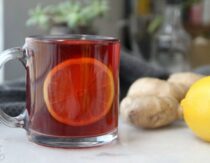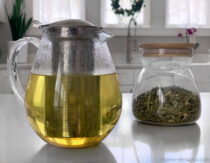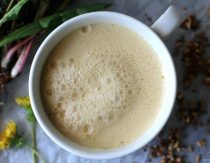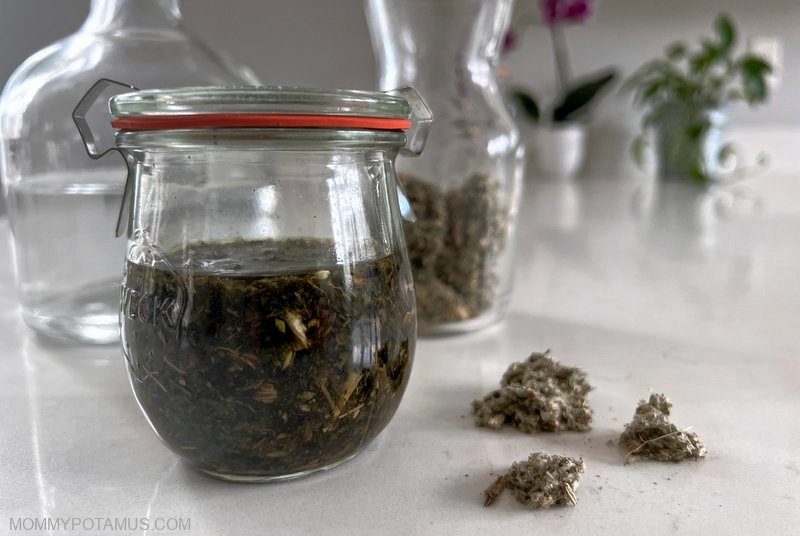
“Can you grab the giant flower from the veggie aisle?” << You’ve probably never said this to anyone, but if you’ve ever asked anyone to pick up an artichoke it’s technically true.
The plant we commonly know as an artichoke is actually the flower bud of the globe artichoke plant (Cynara scolymus). If allowed to fully bloom, it turns into a glorious purple blossom.
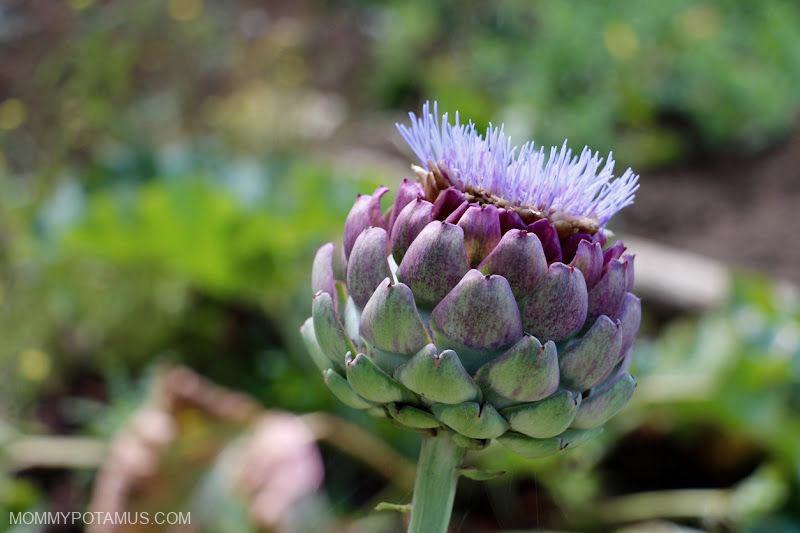
And when harvested early, it becomes a glorious addition to dips, stews, salads and more.
But this article is not about the flower – it’s about the spiky leaves that grow beneath the flower. Artichoke leaves are revered for their ability to support healthy blood lipids, digestion and detoxification, especially liver detoxification.
But while the benefits of artichoke flowers are widely discussed – their prebiotic and antioxidant content, for example – the therapeutic properties of the leaves are less well-known.
And think about it – the world grows this bulky plant for the few flowers we put on our plates. And what happens to the huge mass of leaves? Discarded. Well, no more! Give us herbalists the leaves, and we’ll take care of those tired livers.” – Christophe Bernard (1)
We’ll dive into the benefits below, but first I want to mention that none of these statements have been evaluated by the FDA, this article is not medical advice, and it is not meant to diagnose or treat any condition. Please talk with your healthcare provider about any herbal remedy or dietary supplement you are considering.
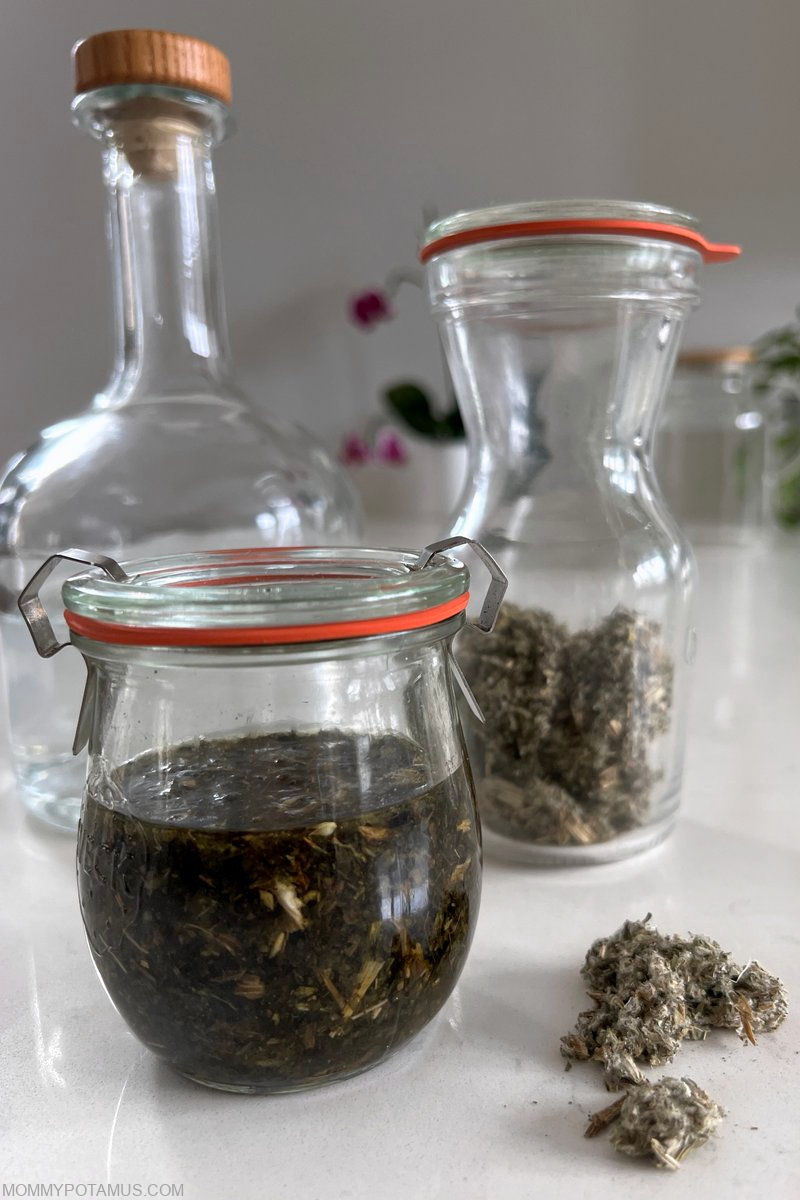
4 Benefits of Artichoke Leaves
When taken regularly, artichoke leaves also help support your body’s natural detoxification strategies. When your detoxification pathways are working well, you will feel energized throughout the day. You’ll have healthy-looking skin and hair, strong digestion, and optimally balanced hormones, resulting in a healthy and happy body.” – Alchemy of Herbs (1)
#1 – Liver Health & Overall Detoxification
For thousands of years this relative of milk thistle, dandelion and burdock root – yep, they’re all related – has been prized for its ability to support liver function and resilience. (2)
It contains the antioxidant compound known as silymarin, which is also the active constituent in milk thistle. Silymarin is a group of flavonoids that activate the Nrf2 detox pathway.
When Nrf2 is activated, it encourages the body to make the body’s master antioxidant: glutathione. (3) (4) Glutathione has more than one job, though – it also functions as a vital detoxification molecule during phase 2 of liver detoxification.
It’s also rich in another compound called cynarin – which supports liver health – plus polyphenols that provide help counteract oxidative stress. (4)
#2 – Digestive Support
Artichoke leaves are “a very different creature than the tame, buttery hearts used in cuisine.” (5)
They’re bitter, which is not usually the favorite of the five flavors our taste buds can detect (the others being sweet, sour, salt and umami).
The bitter flavor does have valuable benefits, though, especially when it comes to easing digestive discomfort and/or promoting strong digestion overall. (6)
As Rosalee de la Foret, author of Alchemy of Herbs, wrote:
One of the secrets to artichoke leaf’s benefits lies in its bitter taste. While most people detest strong bitter tastes, herbalists are obsessed with bitterness and consider it one of the most important tastes for healthy digestion.
How can a taste be good for digestion? The bitter taste is challenging. It not only provokes our taste buds but also stimulates our entire digestive system. Our bodies recognize the taste as being potentially poisonous. As a result, when bitterness is detected our systems go into full alert and digestive juices start flowing in order to mitigate any poisons entering our system. Without these strong flavors, digestion can become sluggish and slow, resulting in gas, bloating, constipation, and other digestive maladies. In other words, we need bitterness daily in order to have good digestion.” (1)
One of the digestive juices she’s referring to is bile, which helps digest fats and carry out toxins that have been processed by the liver. (7)
#3 – Blood Lipids & Cardiovascular Health
Research suggests artichoke leaf may help optimize cholesterol levels. In one double-blind, placebo controlled clinical trial, volunteers receiving artichoke leaf extract for 8 weeks. experienced an increase in “good” cholesterol (HDL-cholesterol) and a reduction in “bad” cholesterol (LDL-cholesterol). (8)
According to de la Foret, “While the exact mechanisms aren’t known, it’s probably that when liver health is supported, the body is better able to metabolize cholesterol.” (1)
Research also suggests that two flavonoids in artichoke leaf extract – luteolin and cynaroside – may have a positive impact on blood pressure. They increase the activity of a special enzyme called eNOS, which is involved in the production of nitric oxide. (9)
Nitric oxide is a vasodilator, which means it relaxes the inner muscles of blood vessels, causing them to widen. This vasorelaxation effect increases blood flow and eases tension within blood vessel walls.
#4 – Antioxidant Support
Our bodies break down toxins and metabolic byproducts via oxidation – a process that transforms them into water-soluble compounds that can be flushed out of the body.
Oxidation generates free radicals, which can damage tissues and accelerate aging unless they are neutralized by antioxidants.
Artichoke leaf provides antioxidant support in two ways by:
- Directly supplying the body with potent antioxidants like silymarin and cynarin
- Serving as an activator of the Nrf2 pathway, which encourages the production of the body’s master antioxidant: glutathione (3)(4)
Artichoke Leaf Tincture Recipe
As a tincture, Rosalee de la Foret recommends making a 1:5 tincture (this is a ratio of herb to alcohol) with the alcohol being at least 60 proof (30% alcohol). The suggested amount is 3-5 ml (about 1/2-1 tsp) three times per day.
Here’s how to make it:
Ingredients
To Make
- Add 1 ounce of dried artichoke leaf (by weight) to an 8 ounce jar. Pour the alcohol over the artichoke leaf, then cover the with a lid and shake it well. If desired, write the start date on the jar using a sticky note, label, or piece of tape – it makes keeping track of how long it’s been steeping easier.
- Place the jar in a dark, room temperature area. (I keep mine in a kitchen cabinet.) Let the mixture steep for 3-5 more weeks. Shake occasionally.
- When it’s ready, strain the mixture through a cheesecloth, making sure to squeeze out as much liquid as possible. Pour the tincture in a clean jar or dropper bottle and store it in a cool, dark area.
Tip for Making Artichoke Leaf Tea
There’s a reason artichoke is much more popular as a concentrated tincture than as a tea. It’s bitter, like really bitter.
I sometimes add 1/4-1/2 tsp to lemon ginger tea to sip before or after a meal, but I don’t brew up artichoke leaf by itself.
Safety Info
I only found a couple of cautions regarding artichoke leaf in all my herbal books and other research sources :
- “People with an existing hypersensitivity to any member of the Asteraceae family should use caution.” (4) Some common flowers in this family that you might recognize are daisies and marigolds.
- Avoid artichoke leaves if you have a known bile duct obstruction or gallstones. (1) (10)
How To Make Artichoke Leaf Tincture
Ingredients
- 1 ounce dried artichoke leaf (by weight)
- 5 ounces 60-80 proof or alcohol (by volume)
Instructions
- Add 1 ounce of dried artichoke leaf (by weight) to an 8 ounce jar. Pour the alcohol over the artichoke leaf, then cover the with a lid and shake it well. If desired, write the start date on the jar using a sticky note, label, or piece of tape – it makes keeping track of how long it’s been steeping easier.
- Place the jar in a dark, room temperature area. (I keep mine in a kitchen cabinet.) Let the mixture steep for 3-5 more weeks. Shake occasionally.
- When it’s ready, strain the mixture through a cheesecloth, making sure to squeeze out as much liquid as possible. Pour the tincture in a clean jar or dropper bottle and store it in a cool, dark area.
Notes
Safety Info
I only found a couple of cautions regarding artichoke leaf in all my herbal books and other research sources :- “People with an existing hypersensitivity to any member of the Asteraceae family should use caution.” (4) Some common flowers in this family that you might recognize are daisies and marigolds.
- Avoid artichoke leaves if you have a known bile duct obstruction or gallstones. (1) (10)
 Tried this recipe?
Mention @mommypotamus or tag #mommypotamus!
Tried this recipe?
Mention @mommypotamus or tag #mommypotamus!
Want more research-backed natural remedies?
No problem, I’ve created a free ebook for you – Kitchen Apothecary: 25+ Natural Remedies Using Ingredients From Your Pantry – as a gift for signing up for my newsletter. You’ll also get updates when I post about safe essential oils for pregnant/breastfeeding mamas, exclusive gifts and coupons (I was able to give away a jar of free coconut oil to anyone who wanted it recently!), plus other goodies.
Sign up using the form below.
Source
1. de la Foret, Rosalee (2017) Alchemy of Herbs: Transform Everyday Ingredients into Foods and Remedies That Heal
2. Salem, Maryem Ben et. al. (2015) Pharmacological Studies of Artichoke Leaf Extract and Their Health Benefits
3. Vargas-Mendoza, Nancy et. al. (2020) Flavolignans from Silymarin as Nrf2 Bioactivators and Their Therapeutic Applications
4. Thomas Easley and Steven Horne (2016) The Modern Herbal Dispensatory
5. Jovial King and Guido Mase (2016) DIY Bitters
6. Bundy, Rafe et. al. (2004) Artichoke leaf extract reduces symptoms of irritable bowel syndrome and improves quality of life in otherwise healthy volunteers suffering from concomitant dyspepsia: a subset analysis
7. Kirchhoff, R. et. al. (1994) Increase in choleresis by means of artichoke extract
8. Rondanelli, Mariangela et. al. (2012) Beneficial effects of artichoke leaf extract supplementation on increasing HDL-cholesterol in subjects with primary mild hypercholesterolaemia: A double-blind, randomized, placebo-controlled trial
9. Li, Huige et. al. (2004) Flavonoids from artichoke (Cynara scolymus L.) up-regulate endothelial-type nitric-oxide synthase gene expression in human endothelial cells
10. Drugs.com. Artichoke


